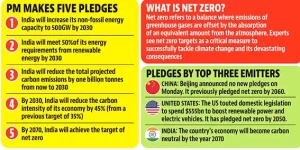21 Nov Climate Change Compensation
Climate Change Compensation
Relevance for Prelims: Emissions Gap report, Climate Change Compensation
Relevance for Mains: Net Zero, Greenhouse Gas Emissions
Context: In a historical move, U.N climate summit in Egypt (COP-27) has created Compensation Fund to address “Loss and Damage’ due to climate change-induced disasters.
Significance of Compensation:
Data from Global Carbon Project shows that between 1751 and 2017, 47% of the carbon-dioxide emissions came from the 28 countries (27 European Countries and United States).
The aforementioned data suggests it is the developed countries have benefitted from Industrial development which has increased the Emission of Greenhouse Gases.

Pic: Global Carbon Project
India’s Emissions:
India is one of the top 7 emitters (others being China, Indonesia, Brazil, Russian Federation, United States, EU-27). Collectively, G-20 members are responsible for 75% of global GHG Emissions.
The average per capita GHG emissions of India stand at 2.4 tonnes of CO2 (carbon dioxide) which is way below that United States (14 tonnes), Russia (13), and China (9.7).
India’s renewable Target:
- The installed renewable energy capacity has been growing rapidly in the last few years and enhancement of its target from 450GW to 500GW.
- The government has pledged to increase the proportion of non-fossil fuel energy to 50% by 2030.
- India also has said it does not plan to start any coal power plant after 2022. Recently, India has achieved 5th rank globally in solar power deployment surpassing Italy.
- India with a total installed capacity of 39.25GW has the highest fourth wind installed capacity in the world.
Significance of Non-conventional sources of Energy
- Thrust on non-conventional sources of energy can fetch economic gains to India. Shift towards non-conventional sources of energy can bring down the cost of energy supply and can also ensure enhanced energy delivery of affordable clean energy that is accessible to all.
- Apart from environmental aspects. The economic benefits are also significant. The transition to renewable energy sources will aid the Indian economy to delink itself from volatile international oil prices.
- India could also handhold other developing nations to explore the path of sustainable development by making the best utilization of non-conventional sources of energy.
Facilitation of transition to non-conventional energy sources holds the key for India’s developmental aspirations. To facilitate a smooth and sustainable transition to non-conventional sources of energy, the mobilization of green finance needs to be adopted at a faster pace.
It is also important to further escalate research and developmental spending on the domain of clean energy sources, so as to come up with sophisticated enabling technologies.
Daily Current Affairs for UPSC
Are you looking for the latest Current Affairs for UPSC Examination? Plutus IAS provides you with the updated and latest Daily Current Affairs for UPSC examination. The topic described above is related to Environmental Ecology, Bio-diversity, and Climate Change. Nowadays it is very crucial for any UPSC aspirant to reading Daily Current Affairs for UPSC examination. So everybody should be habituated to reading Current Affairs for UPSC examination.
Source:
1. DW
Download PDF:
Plutus IAS current affairs eng med 21st November 2022



No Comments